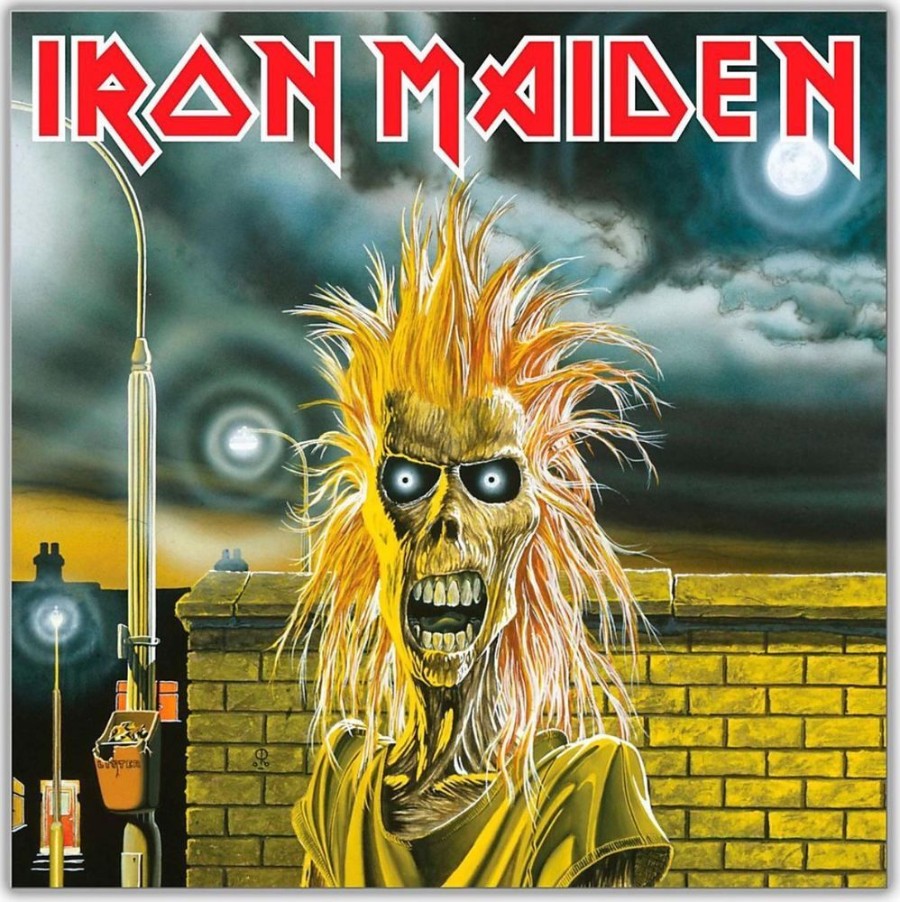I can’t imagine what it must’ve been like 40 years ago, to waltz by a record store to be met with the piercing, empty stare of that contorted, undead madman.
More striking still, I can’t imagine what it was like to hear the sounds beneath that vinyl cover once the needle had dropped for the first time. Unbeknownst to all, that same face and those same sounds were the first sparks in a raging blaze to come that would not only champion the new wave of British heavy metal alongside genre-heavyweights Motorhead and Saxon but would prove to tear down the smokescreen of their underground ambiguity and rise to international acclaim; Iron Maiden had arrived and what an arrival it was.
Maiden’s self-titled debut didn’t so much push metal onward as it did hurl it into a brand new unknown. Yes, the classic thrasher-basher punk-driven melodies of Prowler and “caution to the wind” attitudes of Running Free sing strongly but the wailing harmonics, elaborate (and for once, audible) basslines and just that whiff of the progressive points onward to what would become Maiden’s signature motifs. One rather noticeable absence is the commanding bellows of vocalist Bruce Dickinson who we’ve now come to recognise as the Iron Maiden singer. Do not, for a second, consider giving the album the cold shoulder for fear of something slightly different (okay, a lot different) as Paul Di’Anno’s snappy snarls still allow Maiden to deliver their opening blow with sting.
Traversing down its eight tracks it’s clear that bassist and band leader, Steve Harris, was writing tracks with Dickinson in mind – despite the fact he didn’t know he even existed – with Remember Tomorrow and the album’s centerpiece Phantom of the Opera lending themselves towards the weaker end of Di’Anno’s vocal ability with their intricate melodies and soaring cries that seem to giggle and sneer at Di’Anno waving a sign bearing “Good luck”. Fortunately, for the sake of Di’Anno’s dignity, there are plenty of no frills, no bs rompers like opener Prowler whose delectable guitar solos and earworm chorus are just enough to distract you from the stalker/flasher lyricism, or the eponymous closer that makes doubly sure to leave an imprint on your eardrum with Maiden essentially wailing and crashing their way to the red tape.
Indicative of the album’s debut nature is its wavering poker-face that occasionally breaks entirely from a stern visage by way of the band’s healthy dolloping of youthful spirit and tongue-in-cheek attitude. Running Free takes us through the tale of a troubled youth as he evades the law and pisses off as many people as possible along the way while Charlotte the Harlot is…well that’s sort of obvious isn’t it? This is a lost era for Iron Maiden. Dickinson’s arrival may have taken the band beyond the pits of the underground to global stardom but there’s a part of me that wishes there was space for the odd joke or two amongst his unrelenting obsession with warfare and the odd run-in with Satan.
Shining brightest are the tracks that would carve Maiden’s future. Harris as main songwriter would prove to be the band’s diamond, his love of harmonics, rich bass tones and elaborate setpieces with rapid tempo shifts pushing the band above the large pullulating pool of new metal bands also striking their first notes. Listen to Phantom of the Opera and you will hear it, listen to phenomenal instrumental Transylvania and you will hear it, listen to the tirades of electric guitars on Remember Tomorrow and, funnily enough, you will hear it; Steve Harris desire to push the band beyond just a meat and potatoes metal act cannot be overstated.
So, it’s a great record. One I’m sure many bands would have been lucky to have written, for that matter. Having said this, Maiden’s original outing flies well beneath the radar in the discussion of their greatest works. Perhaps for good reason. Its tracklist, while arguably more lyrically diverse than most other future LPs would come to be, is definitely not the strongest with Paul delivering only where he can. Despite its shortcomings, it was undeniably the first stone in the path that paved its way to the Iron Maiden we know and love. For that I can only be grateful.
Rating: 8/10
By Alex Mace
Feature image credit: EMI

